情态动词
常见的情态动词及其用法
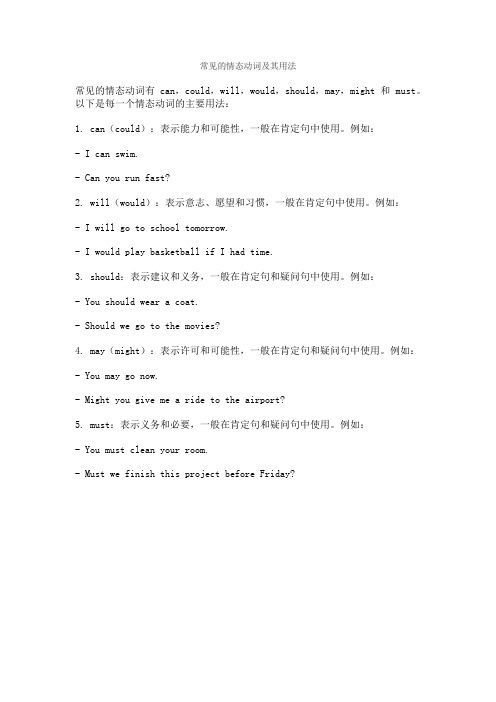
常见的情态动词及其用法
常见的情态动词有 can,could,will,would,should,may,might 和 must。
以下是每一个情态动词的主要用法:
1. can(could):表示能力和可能性,一般在肯定句中使用。
例如:
- I can swim.
- Can you run fast?
2. will(would):表示意志、愿望和习惯,一般在肯定句中使用。
例如:
- I will go to school tomorrow.
- I would play basketball if I had time.
3. should:表示建议和义务,一般在肯定句和疑问句中使用。
例如:
- You should wear a coat.
- Should we go to the movies?
4. may(might):表示许可和可能性,一般在肯定句和疑问句中使用。
例如:
- You may go now.
- Might you give me a ride to the airport?
5. must:表示义务和必要,一般在肯定句和疑问句中使用。
例如:
- You must clean your room.
- Must we finish this project before Friday?。
什么是情态动词
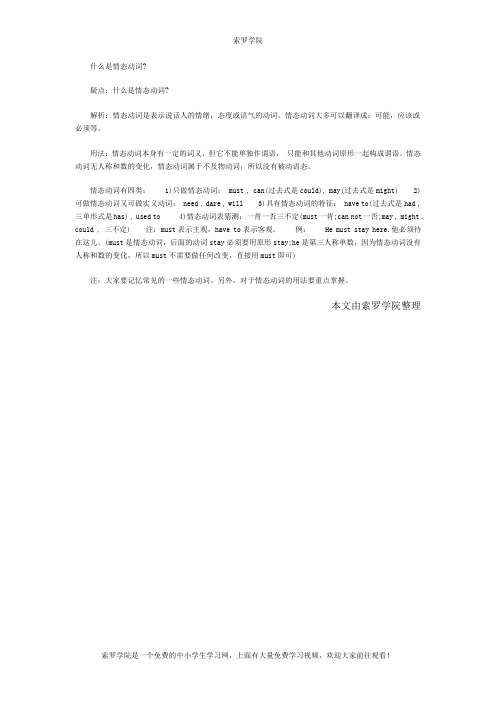
索罗学院
什么是情态动词?
疑点:什么是情态动词?
解析:情态动词是表示说话人的情绪,态度或语气的动词。
情态动词大多可以翻译成:可能,应该或
必须等。
用法:情态动词本身有一定的词义,但它不能单独作谓语,只能和其他动词原形一起构成谓语。
情态动词无人称和数的变化,情态动词属于不及物动词,所以没有被动语态。
情态动词有四类:1)只做情态动词: must , can(过去式是could), may(过去式是might) 2)可做情态动词又可做实义动词: need , dare , will 3)具有情态动词的特征: have to(过去式是had , 三单形式是has) , used to 4)情态动词表猜测:一肯一否三不定(must一肯;can not一否;may , might , could , 三不定) 注:must表示主观,have to表示客观。
例:He must stay here.他必须待在这儿。
(must是情态动词,后面的动词stay必须要用原形stay;he是第三人称单数,因为情态动词没有人称和数的变化,所以must不需要做任何改变,直接用must即可)
注:大家要记忆常见的一些情态动词。
另外,对于情态动词的用法要重点掌握。
本文由索罗学院整理索罗学院是一个免费的中小学生学习网,上面有大量免费学习视频,欢迎大家前往观看!。
情态动词

2) 用来代替may, 谈现在的情况,口气比may更婉转些: A. 表示“可以”(用may时更多一些) Might (may) I have a little brandy? Might I use your phone? B.表示“可能”,“或许” He might tell his wife. She might not believe your story. 3)用于虚拟条件句: If I had known the film was about China, I might have gone to see it. 要是知道这影片是有关于中国的,我可能就去看了 If you invited him, he might come. 如果你邀请他,他可能会来 If you didn’t mind, we might go there. 如果你要晚到,你可以告诉我一声
情态动词
含义和特征
情态动词只有情态意义,即它表示的是说话人对 动作的观点,如需要、可能、意愿或怀疑等。情 态动词具有以下特征: 1)在形式上,情态动词没有实义动词的各种变化, 只有could、would、had to、was(were) to 、 might等几个过去式,其他的如 must、 ought to 等的过去式与现在式同形。 2) 在意义上,大多数情态动词有多个意义。如 can 可表示可能、能够、允许等,may可表示可 能、允许、目的、让步等。 3)在用法上,情态动词与助动词一样,后面须 接动词原形,构成谓语动词。
might的用法
might 主要由以下用法: 1) 用作may的过去式 A. 表示“可以” I asked if I might go home half an hour earlier today. 我问我是否可以提早半小时回家 He asked if he might use the phone. 他问是否可以用一下电话 B.表示“可能”(或许会) He said he might be late. I guessed he might come tomorrow. C. 用在某些状语从句: I did this so that I might have time to prepare my paper. 我这样做以便我有时间把稿子准备好 Try as she might, she could not persuade her friends to go. 不管她这样想办法,都不能说动她的朋友们去
情态动词
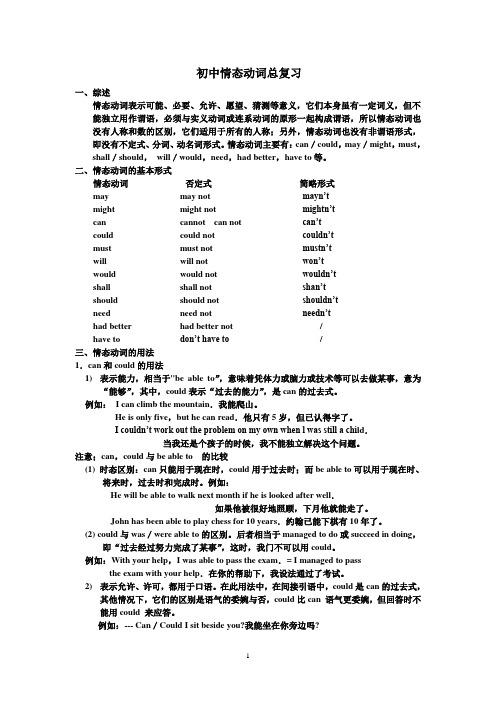
初中情态动词总复习一、综述情态动词表示可能、必要、允许、愿望、猜测等意义,它们本身虽有一定词义,但不能独立用作谓语,必须与实义动词或连系动词的原形一起构成谓语,所以情态动词也没有人称和数的区别,它们适用于所有的人称;另外,情态动词也没有非谓语形式,即没有不定式、分词、动名词形式。
情态动词主要有:can/could,may/might,must,shall/should,will/would,need,had better,have to等。
二、情态动词的基本形式情态动词否定式简略形式may may not mayn’tmight might not mightn’tcan cannot can not can’tcould could not couldn’tmust must not mustn’twill will not won’twould would not wouldn’tshall shall not shan’tshould should not shouldn’tneed need not needn’thad better h ad better not /have to don’t have to /三、情态动词的用法1.can和could的用法1)表示能力,相当于"be able to”,意味着凭体力或脑力或技术等可以去做某事,意为“能够”,其中,could表示“过去的能力”,是can的过去式。
例如:I can climb the mountain.我能爬山。
He is only five,but he can read.他只有5岁,但已认得字了。
I couldn’t work out the problem on my own when l was still a chi ld.当我还是个孩子的时候,我不能独立解决这个问题。
注意;can,could与be able to 的比较(1) 时态区别:can只能用于现在时,could用于过去时;而be able to可以用于现在时、将来时,过去时和完成时。
情态动词归类大全

情态动词一:情态动词的用法:常用的情态动词有can,may,must,need,should, had better.1. can 的用法:①表示能力“能,会” eg: He can speak a little Japanese.他会说一点日语。
②表示请求或许可“可以” eg: Can I help you 要我帮忙吗③表示猜测“可能” eg: Where can she go now 她可能到哪里去了呢的用法:①表示请求或允许“可以”“准许” eg: May I go home,please请问我可以回家吗②表示可能性“可能”、也许” eg: I think it may rain this afternoon. 我想今天下午可能下雨。
注:might为may的过去式,但也可以代替may,语气较为婉转客气或更加不肯定。
eg: ① He might not come today.今天他也许不来了。
(语气不肯定)②You might also get a headache when you work too hard,当你工作太努力时,你也可能患头痛3. must的用法:①表示义务、必要或命令“必须、应该” eg: You must come early tomorrow.你明天得早来。
②表示推测时“肯定,一定” eg: They must be at light is on 他们肯定在家,灯亮着呢.③ must not 禁止,不许 eg: You must not tell lies. 你不许撒谎。
注意:①must开头的疑问句,其否定回答通常用 don't have to 或needn't 。
而不用mustn'teg: ---Must I finish my homework first 我必须先完成作业吗---No, you don't have to/ needn't. 不,你不必。
情态动词详解
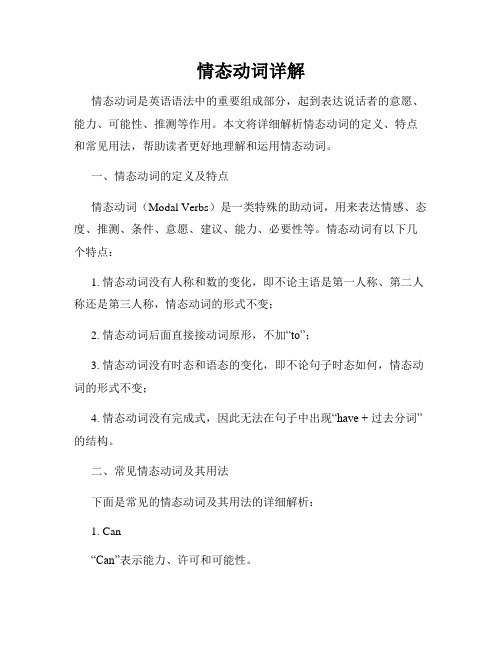
情态动词详解情态动词是英语语法中的重要组成部分,起到表达说话者的意愿、能力、可能性、推测等作用。
本文将详细解析情态动词的定义、特点和常见用法,帮助读者更好地理解和运用情态动词。
一、情态动词的定义及特点情态动词(Modal Verbs)是一类特殊的助动词,用来表达情感、态度、推测、条件、意愿、建议、能力、必要性等。
情态动词有以下几个特点:1. 情态动词没有人称和数的变化,即不论主语是第一人称、第二人称还是第三人称,情态动词的形式不变;2. 情态动词后面直接接动词原形,不加“to”;3. 情态动词没有时态和语态的变化,即不论句子时态如何,情态动词的形式不变;4. 情态动词没有完成式,因此无法在句子中出现“have + 过去分词”的结构。
二、常见情态动词及其用法下面是常见的情态动词及其用法的详细解析:1. Can“Can”表示能力、许可和可能性。
能力:用于表达某人在某方面具有的能力或技能。
例句:He can speak three languages.许可:用于征求或给予许可。
例句:Can I borrow your pen, please?可能性:用于表达可能发生的情况。
例句:It can rain tomorrow.2. Could“Could”是Can的过去式,表示过去或虚拟条件下的能力、许可和可能性。
能力(过去):用于表达过去具备的能力或技能。
例句:When I was young, I could run very fast.许可(过去):用于过去征求或给予许可。
例句:Could I use your phone yesterday?可能性(虚拟条件):用于表示虚拟情况下的可能性。
例句:If I had enough money, I could travel around the world.3. May“May”表示允许、可能性、祝愿和推测。
允许:用于征求或给予许可。
例句:May I come in?可能性:用于表达主观推测的可能性。
什么叫情态动词

什么叫情态动词
情态动词是一种本身有一定的词义,表示说话人的情绪,态度或语气的动词,但不能单独作谓语,只能和其他动词原形构成谓语.
We can be there on time tomorrow.
我们明天能按时去那儿.
May I have your name?
我能知道你的名字吗?
Shall we begin now?
我们现在就开始吗?
You must obey the school rules.
你必须遵守校规.
情态动词数量不多,但用途广泛,主要有下列:
can (could),may (might),must,need,ought to,dare (dared),shall (should),will (would) .
情态动词的位置:
情态动词在句中放在谓语动词之前,谓语动词前若有助动词,则在助动词之前,疑问句中,情态动词则在主语之前.
情态动词无人称和数的变化,情态动词后面跟的动词需用原形,否定式构成是在情态动词后面加 "not".个别情态动词有现在式和过去式两种形式,过去式用来表达更加客气,委婉的语气,时态性不强,可用于过去,现在或将来.。
情态动词

School is over. You can go home now. He said I could borrow his bike . We shall be able to finish the work next week.
(6).否定形式 can not could not
2. 表示否定的情态动词的用法。
3. shall 和 will 的多种意义的区别。
4. 情态动词短语的使用。 5. 虚拟语气中情态动词的使用。
5. — Could I borrow your dictionary?
C — Yes, of course you _______.
A. might
B. will
(5).一般疑问句及回答:
--Must I…? --Yes, you must. --No, you needn’t ∕don’t have to.(不,你不必).
e.y:--Must we go to school on time tomorrow? --Yes, you must. --No, you needn’t.
C 1、Can you play ____piano? A、a B、an C、the B 2、Can you dance? yes, I ____. A、do B、can C、 can’t B 3、Can he Write English? No,he ____ A、can B、 can’t C、does C ride a bike ,but I ____drive a car. 4、I __ A、can , can B、 can’t , can’t C、can, can’t A 5、She can _____basketball . A、play B、playing
情态动词

6. will, would a). 用于疑问句表示说话人向对方提出请求或询问 用 用于疑问句表示说话人向对方提出请求或询问,用 would 比 will 更婉转 客气。用于第二人称。 更婉转,客气 用于第二人称。 客气。 It’s hot. Will you open the windows? Will you help me to work it out? Would you like some coffee? ? b). will (would)决心 愿望。 would 为 will 的过去式 可用于各人称。 决心,愿望 的过去式,可用于各人称 可用于各人称。 决心 愿望。 I will never do that again.
情态动词
定义: 情态动词是一种本身有一定的词义,表示说话人的情绪 表示说话人的情绪,态 定义 情态动词是一种本身有一定的词义 表示说话人的情绪 态 度或语气的动词,但不能单独作谓语 但不能单独作谓语, 度或语气的动词 但不能单独作谓语 只能和其他动词原形构成 谓语。 谓语。
二、情态动词分类 表示能力: 表示能力:can / be able to 表示许可: 表示许可:can / may 表示必须: 表示必须:must / have to / ought to / should 表示虚拟: 表示虚拟:should/ could /would 表示推测: 表示推测:must / should / ought to /can / may 其它: 其它:dare / shall / will / need
4. Why / How + should 表示说话人对某事不理解, 表示说话人对某事不理解, 感到意外,惊异. 感到意外,惊异 Why should he tell a lie? -----Where is Betty living? -----How should I know?
情态动词

Must I do it at once? Yes, you must. / No, you needn’t.或No, you don’t have to. 或 We must obey all the rules. You must not smoke here. ② must还可表示必然结果 还可表示必然结果 All men must die. 人固有一死。 人固有一死。 If you don’t hurry, you must miss the train. 如果不快点,你必然要误车。 如果不快点,你必然要误车。 2. Have to 着重客观需要,能用于更多事态(过去,将来) 着重客观需要,能用于更多事态(过去,将来) He will have to be there before ten. 10点以前他得到那里。 点以前他得到那里。 点以前他得到那里 As he had broken his leg, he had to lie in bed. 因为断了腿,他不得不躺在床上。 因为断了腿,他不得不躺在床上。 3. Ought to表示义务和责任,“应该”,比should 语气强。 表示义务和责任, 应该” 语气强。 表示义务和责任
情态动词

返回
①表能力、可能性、许可 Could you hear that all right? 你能听清楚吗? ②用于委婉、客气地提出问题或陈述看法,回答 时用原形 2.could He said he could come to the party. 他说他会来参加聚会。 —Could I use your dictionary? “我能用一下你的词典吗?” —Yes, you can. “行,可以。”
返回
二、情态动词的用法 can(能);may(可能);could(可能);might 表示推测 (可能);must(一定);should(应该);ought to 情 (应该);will/would(会)
态 表示义
must(必须);have to(不得不);should(应该);
动 务、责任、ought to(应该);need(有必要);needn't(没有 词 必要性 表示能力 必要);don't have to(不必);had better(最好) can(能够);could(能够,过去时);be able to (能够)
返回
一、概述 情态动词表示说话人的语气和情态,如需要、可能、 愿意和怀疑等。情态动词有一定的词义,但不完整,必
须和主要动词的原形一起构成谓语,常用的情态动词有:
can, could, may, might, must, ought to, need, dare 以及 shall, will, should, would;下面短语也表达情态动词的意 义:be able to, be to do, had better, have to。
返回
12.dare多用于疑问句、否定句和条件句中。
What's the matter — daren't you read what it says?
汉语情态动词

汉语情态动词情态动词表示主语做某动作的可能,意愿,必要,也称为能愿动词。
其包括能/能够(can)、会(can/will)、该/应该/应当(should)、配/值、宁可等。
其特点是以实义动词作为补语。
应当注意不同语言的情态动词没有严格的一一对应关系。
有些在汉语中是“情态动词+动词”的表达在其他语言里是“实义动词+动名词作宾语”。
现代汉语的情态动词有:能、能够、可以、会、可能、敢、肯、愿意、情愿、乐意、想、要、应、应该、应当、该、值得、配、好、一定、必须。
扩展资料:用“情态动词+have +done”结构表示对过去动作的推测,高考试题中常用过去时态或过去的时间状语给以暗示。
情态动词的这一用法可以用“对立统一”来概括。
1、当试题的前句和后句在动作和意义上相互补充说明,且整个句意在动作和时间上是一个整体时,我们可用“统一”关系来解决这样的试题。
常见的结构有:must have done:表示对过去动作的肯定推测,常译作“一定做了……”,只能用于肯定句中。
其否定形式为can't/couldn't have done 疑问式为Can/Could...have done?。
could /might have done:表示对过去发生的动作的可能性推测,常译作“可能做了……”2、当试题的前后句在动作和意义上构成转折关系时,常借助“but, however, instead”等词来表示过去的动作与客观事实不符,这时我们就可以用“对立”关系来解决这样的试题。
这种结构常见的有:should have done /ought to have done:表示过去本应该做某事而实际上没有做。
should not have done /ought not to have done:表示过去本不应该做某事但事实上却做了need have done:表示过去本来有必要去做某事,但事实上没有做。
need not have done:表示过去本来没有必要做某事,但事实上却做了。
五大情态动词

五大情态动词情态动词是指表示说话人态度、情感、语气等的动词。
在英语中,情态动词一共有十个,其中五个最为常用,它们分别是can、could、may、might、must。
这五个情态动词在句子中具有很强的语气和功能,可以表达出各种不同的意思和情感。
以下是具体的介绍:1. can:表示能力、许可、推测等意思。
例如,“I can speak Chinese”(我会说中文)、“You can go now”(你可以走了)、“It can be difficult”(这可能很难)等。
2. could:表示过去的能力、请求等意思。
例如,“I could swim when I was young”(我小时候会游泳)、“Could you help me with this?”(你能帮我一下吗?)等。
3. may:表示可能性、许可等意思。
例如,“It may rain tonight”(今晚可能会下雨)、“May I use your phone?”(我可以用你的手机吗?)等。
4. might:表示可能性、推测等意思。
它比may的语气更弱,表示可能性更小。
例如,“He might be late”(他可能会迟到)、“I might go to the party”(我可能会去参加派对)等。
5. must:表示必须、推测等意思。
它的语气很强,用来表达强烈的意愿或推测。
例如,“You must finish your homework”(你必须完成你的作业)、“He must be busy”(他一定很忙)等。
这五个情态动词在英语中使用频率很高,掌握它们的用法和意义对于学习英语非常重要。
常见的情态动词有

常见的情态动词有情态动词是英语中重要的词类之一,它们强调了说话者对某种态度、情感或推测的表达。
在英语中,一共有十种情态动词,它们分别是 can、could、may、might、shall、should、will、would、must 和 ought to。
下面将分别介绍这十种情态动词的基本用法和常见表达方式。
1. cancan 是情态动词中最常用的一种,用于表示“能力”、“许可”或“可能性”等含义。
例如:- I can speak Chinese fluently.(我说中文说得很流利。
)- Can I borrow your pen for a moment?(我能否借一下你的笔?)- It can be difficult to understand Shakespeare.(理解莎士比亚可能会很困难。
)can 的否定形式是can’t,表示“不能”或“不可能”。
例如:- I can’t run very fast.(我跑不太快。
)- This can’t be true.(这不可能是真的。
)2. couldcould 是 can 的过去式,也可以表示“能力”、“许可”或“可能性”。
它比 can 更委婉,常用于礼貌性的请求、建议或询问。
例如:- Could you please pass me the salt?(你能把盐递给我吗?)- I think we could try to finish this project by next week.(我想我们下周会试着完成这个项目。
)- It could rain later, so take an umbrella just in case.(天气可能会下雨,所以带把伞以防万一。
)could 的否定形式是couldn’t,表示“不能”或“不可能”。
例如:- I couldn’t understand what he was saying.(我听不懂他在说什么。
英语情态动词有哪些
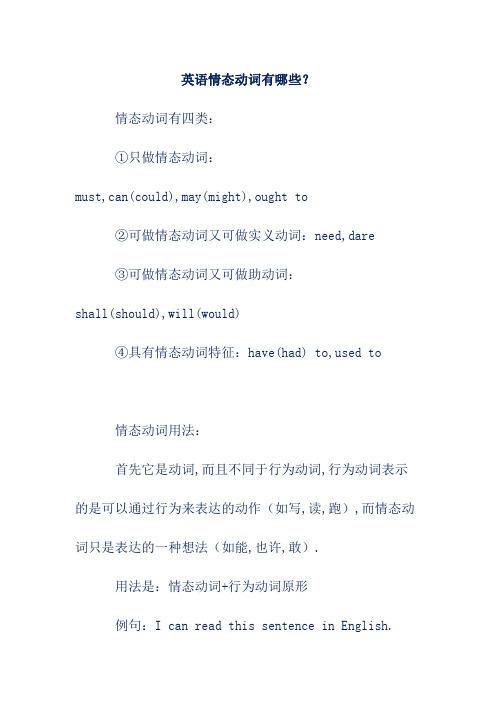
英语情态动词有哪些?情态动词有四类:①只做情态动词:must,can(could),may(might),ought to②可做情态动词又可做实义动词:need,dare③可做情态动词又可做助动词:shall(should),will(would)④具有情态动词特征:have(had) to,used to情态动词用法:首先它是动词,而且不同于行为动词,行为动词表示的是可以通过行为来表达的动作(如写,读,跑),而情态动词只是表达的一种想法(如能,也许,敢).用法是:情态动词+行为动词原形例句:I can read this sentence in English.我能用英语读这句话.情态动词是一种本身有一定的词义,表示说话人的情绪,态度或语气的动词,但不能单独作谓语, 只能和其他动词原形构成谓语.We can be there on time tomorrow.我们明天能按时去那儿.May I have your name? 我能知道你的名字吗?Shall we begin now?我们现在就开始吗?You must obey the school rules.你必须遵守校规.情态动词数量不多,但用途广泛,主要有下列:can (could), may (might), must, need, ought to, dare (dared), shall (should), will (would),have (to) ,had better.情态动词还有一个很重要的用法,即情态动词表推测——一、情态动词表推测的三种句式1.在肯定句中一般用must (一定),can,could (可能),might /may(也许,或许)。
(1)He must/can/may,might know the answer to this question.他一定/可能/也许知道这个问题的答案。
(2)It is cold in the room. They must have turned off the heating.屋里很冷,他们肯定把暖气关了。
英语语法:情态动词

英语语法:情态动词情态动词(Modal verbs)本身有一定的词义,表示语气的单词。
但是不能独立作谓语,只能和动词原形一起构成谓语。
情态动词用在行为动词前,表示说话人对这一动作或状态的看法或主观设想。
小编在这里整理了相关知识,快来学习学习吧!英语语法:情态动词一、can和could1、can的用法(1)表示体力和脑力方面的能力。
(2)表示对现在的动作或状态进行主观的猜测,主要用在否定句和疑问句中。
(3)表示可能性,理论上的可能性,意为“有时候可能会”,可用于肯定句。
(4)表示允许,意思与may接近。
(5)表示说话人的推测、怀疑、惊异、猜测或不肯定等,主要用于否定句、疑问句或感叹句中。
(6)can的特殊句型cannot…too / enough表示“无论怎么。
也不过分”。
“越。
越好”。
cannot but+ do sth.表示“不得不,只好”。
2、could的用法(1)表示能力,指的是过去时间。
(2)表示允许,指的是过去时间。
(3)表示可能,可以指过去时间,也可以指现在时间,表示语气缓和。
(4)委婉客气地提出问题或陈述看法,指的是现在时间。
主要用于疑问句,回答时用can。
3、can与could的区别can表推测时只用于否定句和疑问句(could无此限制)。
couldn’t的可能性比can’t小。
4、can与be able to的区别(1)现在时:无区别,但后者不常用。
(2)完成时;can没有完成时,此时要用have(has,had)been able to。
(3)将来时:can没有将来时,要用will be able to。
(4)过去时:could表示一般能力,was/were able to 表示在具体场合通过努力成功做成某事的能力。
二、may 和might1、may的用法(1)表示询问或说明一件事可不可以做。
(2)表示一件事或许会发生或某种情况可能会存在,通常用在肯定句和否定句中。
注意:表示可能性时,can’t语气强,表示“不可能”,may not语气弱,表示“可能不”。
情态动词

情态动词情态动词不随主语人称、数的变化而变化,但有时态的变化。
一、will/would1)用于第二人称的问句中表示提出请求、建议、规劝、命令等,would更委婉。
意思是“……好吗?,行吗?”等Will / Would you pass me the ball, please?2)★★★★★用于各种人称表示主语的意志、允诺、愿望和决心。
意思是“愿、要、肯、会、无论如何总要”等The car wouldn’t start. (该用法尤其重要,一般不用被动语态)I will never do that again.They asked him if he would go abroad.The door . Better have it repaired.A. isn’t shutB. hasn’t been shutC. won’t be shutD. won’t shut----- Daddy, Would you buy me an MP3 player if I do well in the first English speech contest?----- I , I promise. “I/We will ……可表示说话者说话时的决定”A, would B, will C, shall D, do“Won’t you……”是客气的套语,表示邀请。
Won’t you sit down?3)★★★★★would表示过去反复发生的动作,句中常有明确表示过去的时间状语。
注意其与used to 的区别。
During the vacation, he would visit me every other day.4) 表示习惯性、经常性、倾向性的含义。
意思是“总是、毕竟是、惯于”等。
The wound would not heal.(某种倾向)Boys will be boys.Fish will die out of water.5)表示估计、猜想、推测、预见等,意思是“可能、该是、当是、似为”等。
常用的情态动词

1.情态动词本身有词义, 但词义不完全.2.不能单独作谓语,只能和动词原形一起构成谓语.3. 情态动词没有人称和数的变化( 除“have to”).1. can /could1)can ,could 用在肯定句中表示理论上的可能性,“经验之谈”As a human being, anyone can make a mistake.2)表示推测时,主要用在否定句或疑问句中。
can’t be\couldn’t be “肯定不是……, 不可能…”It’s so late. Can Tom be reading?It can’t be Mary. She has fallen ill.can/could not be doing “肯定不是正在做……”can/could not have done “过去不可能做某事”3)can/could have done 用于肯定句中“本来能做”You could have had a better mark.4)---Could (Can) you…?--- Yes, I can (不用could)--- May I use your computer?--- Of course you can.5) cannot (help\choose)but +动词原形“不得不,只能”I cannot help but tell her the truth.cannot help it “控制不住,没有办法”cannot …too……“无论怎样也不为过”I cannot thank you too muchcannot help doing sth 禁不住做某事6)couldn‘t +动词原形+比较级(再…不过了)It couldn't be better.I couldn't agree with you more.2may与might用法1.) 表示推测时,用于陈述句,表示把握不大。
13个情态动词表格归纳

13个情态动词表格归纳情态动词是一类特殊的助动词,用于表示说话人对某种行为或状态的推测、可能性、意愿、能力、许可和义务等。
以下是13个常见的情态动词:情态动词含义例句can能够I can swim.could过去能力We could run fast when we were young.may可能He may be at home.might可能(过去) They might have left already.shall将要Shall we go to the park tomorrow?should应该You should brush your teeth twice a day.will将要She will visit her grandparents next month.would愿意/过去习惯We would go hiking on weekends.must必须You must wear a seatbelt in the car.must not禁止You must not smoke here.need需要The plants need water to grow.need not不需要You need not come to the meeting.ought to应该You ought to apologize for your behavior.拓展:除了以上列出的13个常见的情态动词外,还有其他的情态动词,如:dare(敢)、used to(过去常常)、would rather(宁愿)、have to(不得不)、had better(最好)等。
这些情态动词也有各自的用法和含义,可以根据实际需要进行学习和运用。
- 1、下载文档前请自行甄别文档内容的完整性,平台不提供额外的编辑、内容补充、找答案等附加服务。
- 2、"仅部分预览"的文档,不可在线预览部分如存在完整性等问题,可反馈申请退款(可完整预览的文档不适用该条件!)。
- 3、如文档侵犯您的权益,请联系客服反馈,我们会尽快为您处理(人工客服工作时间:9:00-18:30)。
高三专项复习—情态动词特殊用法大集合1.can/could⑴can 和could 用于肯定句,可以表示某人或某物一时的特点,可以翻译为“有可能,有时会”。
It can be very warm in this area.这个地区有时可能非常暖和.He can be very friendly at times.他有时会非常友好。
⑵can表示能力时(即有某种知识和技能而能办到),可以与be able to 换用。
但是在将来时和完成时中必须用be able to ;表示经过努力而成功地办到了某个具体的事情时,只能用be able to ,不可以用can。
这种用法的be able to 相当于succeed in 或manage to。
I am sure we shall be able to get you a job soon.(不能用can)After years of hard work he was able to win the prize.(不可以用could)(3)cannot /can't /can never与too或enough 等词连用,意思是“无论怎样……也不为过”、“决不会……够(过)”。
You can't praise him too much.你无论怎样称赞他都不过分。
You cannot / can never be too careful.=You can never/not be careful enough.你越细心越好。
(4)“cannot wait 不定式”意思是“be eager to ……急于做”,表示强调的肯定意思.I cannot wait to read the book。
我非常渴望读这本书.He couldn’t wait to see her。
他渴望见到她.2.must有一种含义:“偏要”“硬要”。
表示说话人对句子主语所发出的动作或行为是不希望的、不满的甚至是生气的。
通常指令人不愉快的事情。
must用于第二人称时,常常含有讽刺挖苦的意思:Why must you be so stubborn (固执)?He must come and worry her with questions ,just when she was busy cooking the dinner.If you must smoke ,at least you could use an ashtray (烟灰缸)。
Why must you be so late ?你为何非要这么晚来呢?(2)对must 所在句子变反意疑问句时,应注意以下习惯搭配:③“must be ”表示推测时,反意疑问句用be 的适当形式.You must be thirsty ,aren’t you ?你一定渴了,是吗?④“must have done ”表示推测时,附加疑问句一般用have 或has ,但是有明确表示过去的时间壮语(before 除外)时,反意疑问句用过去时态。
He must have finished the work ,hasn’t he ?He must have gone abroad last week ,didn’t he ?You must have been told about it that day ,weren’t you ?⑤mustn’t表示“禁止,不允许”时。
The children mustn’t play with fire.ed to 的意思是“过去常常”,已经含有always ,often ,sometimes ,from time to time 等意思,但是它却可以和它们连用。
He always used to come by bus. 他过去总是坐公共汽车来。
He often used to work late at night.他过去经常工作到深夜。
另:would 和used to 的区别如下:两者都可以表示过去的习惯性动作。
但是would 只强调过去特定情况下的习惯性动作(由动态动词表示),单纯的过去和现在无关;而used to 即可以强调过去的习惯性动作(由动态动词表示),也可以强调过去的事实或状态(由静态东此表示),且与现在形成对比,即可表示持续的状态,也可表示过去重复的行为。
I used to have an old car.过去我有一辆旧轿车。
I didn't use to like opera ,but now I'm getting interested.我过去不喜欢歌剧,但现在逐渐有了兴趣。
上面两句话的动词均是静态动词,说明过去的事实或状态,不能用would 代替used to. 4.shall可以用在第二、三人称,表示说话人的意图、意志、允诺、命令、命运或必然结果等;在法律、条约、协定等文件中可以表示义务、规定等。
用于一、三人称表示征求对方意见。
You shall have a lot of money. (意图/允诺)你会有很多钱的。
Each citizen shall carry his identification card when travelling.(规定)旅游时每个市民务必带上身份证。
You shall arrive there before sunset. (命令)你们要在日落前到达那儿。
If you don't behave yourself, you shall be punished. (威胁)如果你行为不轨的话,你会受到惩罚的。
The task shall be finished by Sunday. (允诺)任务会在星期天前完成的。
He shall get what he deserves. (警告)他会得到他应该得到的。
Death is certain to all; all shall die.(命运)死必临万物;万物皆必死。
The new regulation shall take effect on May the first. (规定)新章程自五月一日起实施。
Shall he come in?1-4练习题:1.Please remind your grandpa to take medicine on time,for a man of his age _______be very forgetful.A.should B. must C. shall D. can2.You cannot be _______careful when you drive a car. A. very B. so C. too D. enough 3.The car broke down on the way, but we _____get out of the desert at last.A. mightB. wouldC. were able toD. could4.-----The students must hand in their term papers in a week ,_______?-----No,they _______。
A.needn’t they ,mustn’t B.mustn’t they ,mustn’tC.mus tn’t they ,needn’t D.shouldn’t they ,should5.When he was there, he_______go to that coffee shop at the corner after work every day.A. wouldB. shouldC. had betterD. might6.There used to be a theatre here, __________________/_______________________?7.It has been announced that candidates _______remain in their seats until all the papers have been collected.A. canB. willC. mayD. shall8.Hav en’t I told you already that you _______have my answer tomorrow morning ?A. willB. shallC. shouldD. would9.Nobody _______throw away rubbish everywhere! A. can B. need C. shall D. must10. Why _______you always interrupt me ?A. can B. will C. may D. must11.Naturally,after I told her what to do,my daughter _______go and do the opposite !A. mayB. canC. mustD. should5. will⑴表示意愿或固执坚持。
用于非人主语时,表示固有性质,倾向。
She won't lend me the money.她不愿把钱借给我。
The window won't open.窗子打不开。
The door won't shut.门关不上了。
⑵在含有if从句的主从复合句中,如果if引导的条件状语从句表示的是一般将来时或过去将来时,不能用will或would ,而要用一般现在时或一般过去时来代替。
If you don't come here , I will go to find you.但是will可以用在if从句中表示各种“愿望”,If you will make another try , I shall do everything possible to help you.(意愿)如果你愿意再试一次的话,我愿近一切可能帮助你。
⑶will可以用来表示某些根据自然规律必定会发生的事情,并且此时可以用一般现在时来代替它。
Oil will float on water.油能在水上漂流。
If the pure water is heated to 100°C, it will boil(可以用boils).如果纯净的水加热至100°C,它就会沸腾。
6. need⑴作为情态动词时主要用在否定句和疑问句中They needn’t arrive so early =They do n’t need to arrive so early.他们不必很早到达。
